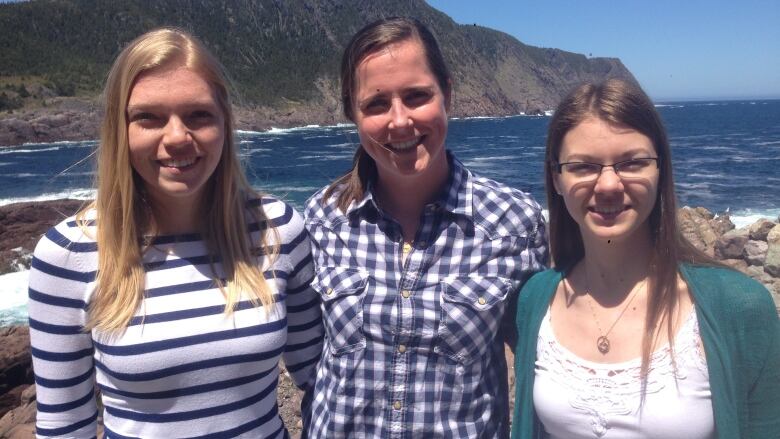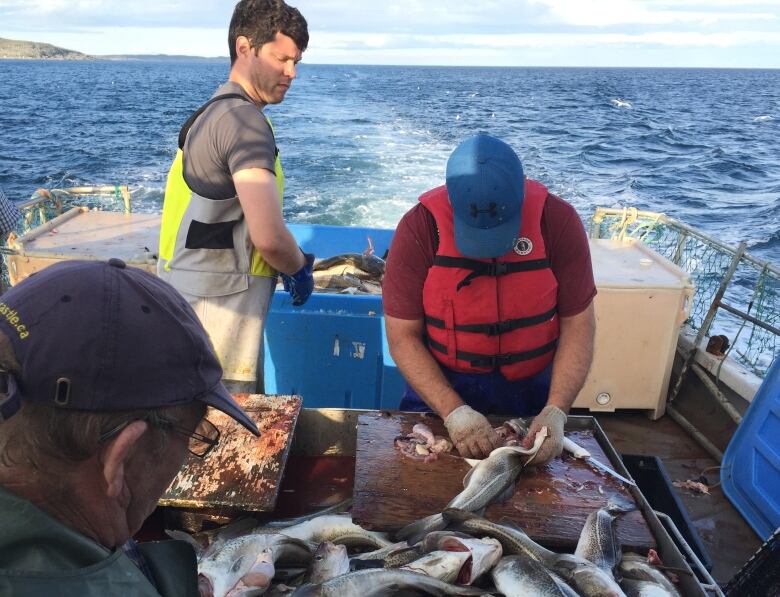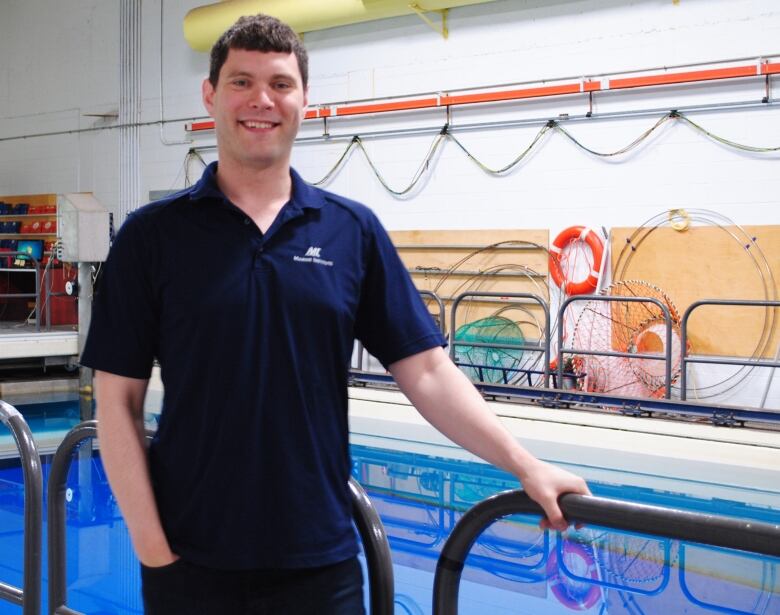Meet the young scientists who hope to save N.L.'s fishery
Some of the bright lights in fisheries science weren't even born when cod fishery shut down

A race is underway in laboratories in Newfoundland and Labrador to dispel the darkness caused by years of cuts to fisheries science. For those involved, the stakes are nothing less than the health of the fishery itself.
What's remarkable: some of the top scientists were just children when Newfoundland's world-famous cod fishery was shut down in early July 1992, and a few were not even born.

"There is a new generation of researchers,"says Nicolas Le Corre, 34, as he flips open his laptop computer, which he uses to study how ocean currents might affect shrimp.
Le Corre, who is collaborating on a post-doctoral thesiswith scientists from Memorial University, the Marine Institute and the Department of Fisheries and Oceans,spends his days in a virtual ocean powered by a super-fast microprocessor and 25 years of data about tides and currents.
Le Corre is part of a group of new, young fisheries scientists who have come to the province on a wave of new funding for fisheries and marine research.
- Trans-Atlantic research aims to unlock climate change mysteries
- DFO needs to make science a priority in decision-making, prof says
The new money, which includes a federal injection of almost $200 million into DFO's research programs,will see 28 new jobs in St. John's by 2018.
It will also include the establishment of the Ocean Frontier Institute, aimed at creating a unified ocean science research facility amonguniversities in Atlantic Canada.
A different generation, with a different outlook
These young scientists have grown upwith the threat of climate change and its demand for a broader ecological approach to conservation. They're using new tools with a generation of data to build models and answer questions about the future of our oceans.

The researchers are racing to make up for lost time after years of cuts to fisheries and oceans research by successive federal governments, including an$80-million reduction to DFO's budget in 2012 by the Conservatives that, in 2013, was followed with a plan to cut $100 million more over the next three years.
The cuts overall resulted in hundreds of job losses and closure of seven ofDFO's11 regional libraries across the country.
Le Corre is using the virtual ocean to figure out where shrimp larvae go. DFO has years of data on older shrimp because they're big enough to be caught and counted.
But shrimp larvae are minuscule the size of the head of a pin. Even though shrimp is a lucrative industry, with a landed value in 2016 of $256 million in Newfoundland and Labrador, scientists know very little aboutwhere the larvaego and how they survive.
Working with his software, Le Corre releases thousands of virtual shrimp eggs into the model and lets the current data predict where they'll be once they're big enough to match up with existing DFO data.
"For me, fisheries science needs to consider the whole ecosystem as much as possible," he said.
"Now we have tools to easily collaborate from a local to a worldwide scale, and we have more opportunities for collaboration.
"The new people at DFO are coming from various interdisciplinary backgrounds in ecology, biology, fisheries and oceanography."
Why didn't the cod bounce back?
At Memorial University's Ocean Sciences Centre in Logy Bay, there's a lab where three young women the oldest of whom is just 25 are trying to answer an old question:why didn't the cod bounce back faster when the moratorium was imposed in 1992?
Emma Cooke, Evelyn MacRobert and Emilie Geissinger whoare known as the Three Es in their lab are working together to shed light on the health of the cod stocks, which had already gone intoa deep spiral before then federal fisheries minister John Crosbie triggered what's been called the largest industrial layoff in Canadian history.
Climate change is what keeps me up at night.- Brett Favaro, Marine Institute
The three researchers found that DFO'scod data issimilar to what's known about shrimp: the numbers reflect cod that were big enough to be noticed by researchers. What happens when cod are very young is unknown.
MacRobert who looks at how juveniles avoid being eaten by predators when they're hiding out in eelgrass, a preferred locationin the first year of life uses underwater video to watch the cod and to collect data about what they're doing.
"Underwater video is an up-and-coming data collection method," she said.
Nearby, Cooke takes data about baby cod and links it to DFO data about older cod, and Gesseigner looks at how factors like temperature contribute to the juveniles' ability to make it through their first winter.
The overarching goal is to provide an ecological model using environmental conditions to predict how the little ones will survive. This will help scientists tell the story of how cod move around the inshore areas and at what age they move offshore.
"It's a piece of the puzzle that could lead to better assessments and better quotas," said Gesseigner.
A youthful edge
It'll also allow scientists to predict how the fish will be affected by climate change.
"Climate change is what keeps me up at night," said Brett Favaro, an instructor at the Marine Institute in St. John's.

"I think we'll get to a point in my lifetime where fisheries science is essentially perfect. And I worry that right as we figure that out, we're going to get hit by the freight train of climate change."
Favaro worries that scientists will use their models "to watch as fish move away from our fishing grounds, as they seek cooler water or as the productivity decreases because there's less oxygen in the water or as the ocean gets more acidic and anything with a shell has trouble persisting."
At just 31, Favaro isrunning the Marine Institute's new graduate programs in fisheries science: two masters-level programs one in stock assessment and one in science and technology and a PhD in fisheries science.
It's the Marine Institute's first PhD program. Students start in September.
Favaro is creating programs that will give graduates experience in the field and with data science and coding.
Students will also be required to take a course in science communication. Communication and open, accessible data, he said, will be key in creating the trust needed amongscientists, policy makers and fishermen to build a well-managed, sustainable fishery that can survive stressors like climate change.
"It has to be a cornerstone," he said.
"We're going to have to get on problems a lot faster than we used to."












_(720p).jpg)


 OFFICIAL HD MUSIC VIDEO.jpg)
.jpg)



























































































